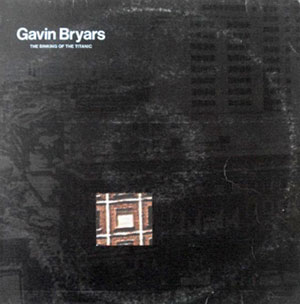
Gavin Bryars (b. 1943)
00:24/24:25
Obscure No. 1
The Sinking Of The Titanic (1975)
The Sinking Of The Titanic
Jesus’ Blood Never Failed Me Yet
Obscure (UK)
Catalog#: Obscure No. 1
Format: Vinyl, LP
Country: UK
Released: 1975
Tracklist
A The Sinking Of The Titanic
Conductor, Piano – Gavin Bryars
Double Bass – Sandra Hill
Leader [Director] – Howard Davidson, Howard Rees
Musical Box [Music Box] – Angela Bryars
Strings – Cockpit Ensemble, The
Violin – John Nash (2)
Voice [Spoken] – Miss Eva Hart
B Jesus’ Blood Never Failed Me Yet
Conductor – Gavin Bryars
Double Bass – Sandra Hill
Guitar – Derek Bailey
Leader [Director] – Howard Davidson, Howard Rees
Orchestra – Cockpit Ensemble, The
Organ – Michael Nyman
Tuba – John White
Violin – John Nash (2)
Producer – Brian Eno
Written-By – Gavin Bryars
Notes
stock black die cut inner
‘island records’ at bottom of label, ‘1975 Island Records Ltd’ at left
‘Manufactured and distributed by Island Records Ltd.’ lower right rear sleeve
Jesus Blood Never Failed Me Yet
In 1971, when I lived in London, I was working with a friend, Alan Power, on a film about people living rough in the area around Elephant and Castle and Waterloo Station. In the course of being filmed, some people broke into drunken song – sometimes bits of opera, sometimes sentimental ballads – and one, who in fact did not drink, sang a religious song “Jesus’ Blood Never Failed Me Yet”. This was not ultimately used in the film and I was given all the unused sections of tape, including this one.
When I played it at home, I found that his singing was in tune with my piano, and I improvised a simple accompaniment. I noticed, too, that the first section of the song – 13 bars in length – formed an effective loop which repeated in a slightly unpredictable way. I took the tape loop to Leicester, where I was working in the Fine Art Department, and copied the loop onto a continuous reel of tape, thinking about perhaps adding an orchestrated accompaniment to this. The door of the recording room opened on to one of the large painting studios and I left the tape copying, with the door open, while I went to have a cup of coffee. When I came back I found the normally lively room unnaturally subdued. People were moving about much more slowly than usual and a few were sitting alone, quietly weeping.
I was puzzled until I realised that the tape was still playing and that they had been overcome by the old man’s singing. This convinced me of the emotional power of the music and of the possibilities offered by adding a simple, though gradually evolving, orchestral accompaniment that respected the tramp’s nobility and simple faith. Although he died before he could hear what I had done with his singing, the piece remains as an eloquent, but understated testimony to his spirit and optimism.
The piece was originally recorded on Brian Eno’s Obscure label in 1975.
— Gavin Bryars.
